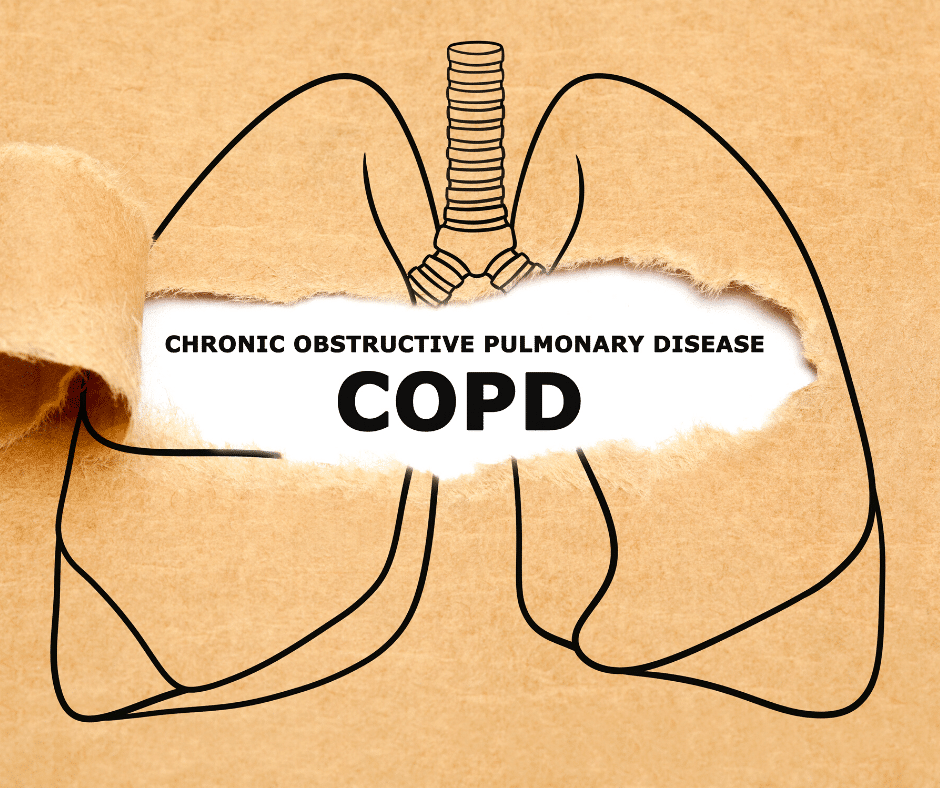
Chronic Obstructive Pulmonary Disease, or COPD, is a life-threatening lung disease that makes it difficult for people to breathe. Airflow from the lungs can become trapped when trying to exhale through obstructed airways. This can be caused from inflammation or narrowing of the airways, excess mucus or scarring. Emphysema and Chronic Bronchitis are the most common conditions that make up the diagnosis of COPD.
Emphysema is a chronic condition caused by damage to the air sacs (alveoli) in the lungs. Air becomes trapped in the alveolar sacs and over time they will become destroyed from the damage. This makes it harder to breathe.
Chronic Bronchitis is a long-term inflammation of the bronchi (air passages) in the lungs. The inflammation is generally caused by an excess build-up of mucus.
COPD remains the 3rd leading cause of death in the United States. It is estimated to affect more than 24 million Americans and many of them are not even diagnosed or aware they have the disease.
Smoking is the primary cause of COPD. If you have been diagnosed with COPD and quit smoking then you can reduce further damage or progression of the disease from occurring. If you are currently a smoker it is important to quit. Damage to the lungs from COPD cannot be reversed but continued progressive damage can be reduced or stopped by following some helpful ways to keep your lungs healthy.
Ways to keep your lungs healthy and hopefully avoid being diagnosed with COPD is:
- Avoid smoking and second hand smoke
- Air pollution or occupational exposures
- Staying active with regular physical activity or a Pulmonary Rehab program
- Taking medications correctly and receiving important vaccines such as yearly flu shots and a pneumonia shot when appropriate
How can I tell if I have COPD?
COPD is diagnosed with a simple breathing test called Spirometry, which can detect the disease before symptoms start to appear. With COPD the air leaves the lungs slower than normal during a forced expiration.
How is COPD treated?
The most important treatment is going to be smoking cessation. Your medical provider may prescribe the use of a bronchodilator and/or inhaled steroid/anti-inflammatory medication to help treat the lungs and improve your breathing. It is always important to take your medications as they are prescribed to get the most benefit from them. In advanced stages of COPD oxygen may need to be prescribed.
When a person hears about COPD you tend to think of it as a “smoker’s disease” for the most part. It is known that individuals can be diagnosed with COPD and will never have smoked a day in their life, or been exposed to second hand smoke. Maybe a person was diagnosed with COPD at a young age.
This may actually be a genetic defect called Alpha-1 Antitrypsin. This is the most common genetic risk factor for COPD. It can be diagnosed with a blood test to measure the level of Alpha-1 Antitrypsin, or AAT, in your blood.
Alpha-1 Antitrypsin is an inherited condition that raises your risk for lung and/or liver diseases such as Emphysema and Cirrhosis of the liver. It is a protein that helps protect the lungs from damage due to inflammation. It also protects the body’s tissues from being damaged by infection-fighting agents released by its immune system. Low levels of this protein increase your risk of developing COPD. The protein is made in the liver.
Alpha-1 Antitrypsin can often be diagnosed initially as Asthma or COPD. About 3% of all people diagnosed with COPD may have undetected Alpha-1 Antitrypsin.
Some of the signs and symptoms of lung disease caused by Alpha-1 Antitrypsin deficiency are:
- Shortness of breath
- Wheezing with breathing
- Excessive cough with phlegm, increased sputum productions
- Decrease in exercise capacity and a persistent low energy state of tiredness
- Chest pain that increases during inhalation (when breathing in)
Some of these same symptoms can also be associated with COPD. At a first glance it is easy to see how Alpha-1 Antitrypsin and COPD can be interchanged in diagnosis.
If you or anyone you know are experiencing any symptoms discussed above, please speak to your provider to see what programs or treatments are available. At Windom Area Health, we offer Respiratory Care Services that include a Pulmonary Rehabilitation program that can help you manage breathing problems, increase energy level and decrease feelings of breathlessness. If you want more information about how we can help, call and speak to Windom Area Health’s Respiratory Therapist, Rhonda Wahl, at at 507-831-0647.
By Rhonda Wahl, RRT, Respiratory Therapy Coordinator
